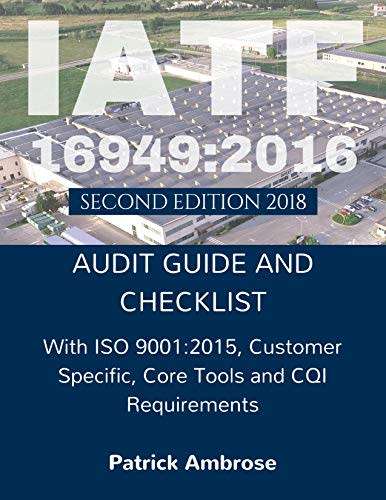
IATF 16949:2016 Audit Guide and Checklist 2nd Edition
Check my rate
| Main centres: | 1-3 business days |
| Regional areas: | 3-4 business days |
| Remote areas: | 3-5 business days |

| Main centres: | 1-3 business days |
| Regional areas: | 3-4 business days |
| Remote areas: | 3-5 business days |
Book is in good condition. Book is a paperback.
Pat Ambrose's IATF 16949:2016 Audit Guide and Checklist Second Edition has over 300 pages of insightful and practical advice for planning, deploying and improving a Quality Management System (QMS) in the automotive sector. It covers every requirement in both ISO 9001 and IATF 16949 plus Customer Specific Requirements (GM, FORD, FCA, VW, PSA), all current Core Tools, and CQI requirements.
The IATF 16949:2016 Audit Guide and Checklist provides all the information necessary for an in-depth assessment of your ISO 9001:2015 / IATF 16949:2016 Quality Management System. It was written to help auditors conduct a process based audit and stresses process effectiveness as well as compliance. The evidence-based questions start with top management and flow through the path of a generic product within an organization.
Following insightful chapters on such topics as process design, process auditing, PDCA, Turtle Diagrams, Context of the Organization and Systems Integration you can dive into the evidence-based questions. The first part of the audit examines the complete system. This includes questions about the conformity of the system to the standard along with dozens of Best Practice questions to help you better evaluate the effectiveness of the system. Questions in the second part focus on the effectiveness of the processes that are found in almost any organization, regardless of industry or sector.
This Guide covers every requirement in both ISO 9001 and IATF plus Customer Specific Requirements (GM, FORD, FCA, VW, PSA), Core Tools (APQP (2018), FMEA (2018), Control Plans, MSA, Process Capability, and PPAP) and CQI requirements (8, 9,11, 12, 14, 15, 17, 19, 23, 24).
The Guide includes: 584 Assessment questions, 188 questions related directly to Customer Specific Requirements, 71 Core Tools Questions and 15 Specific CQI Questions and 150 valuable notes designed to help auditors understand the intent of specific questions.